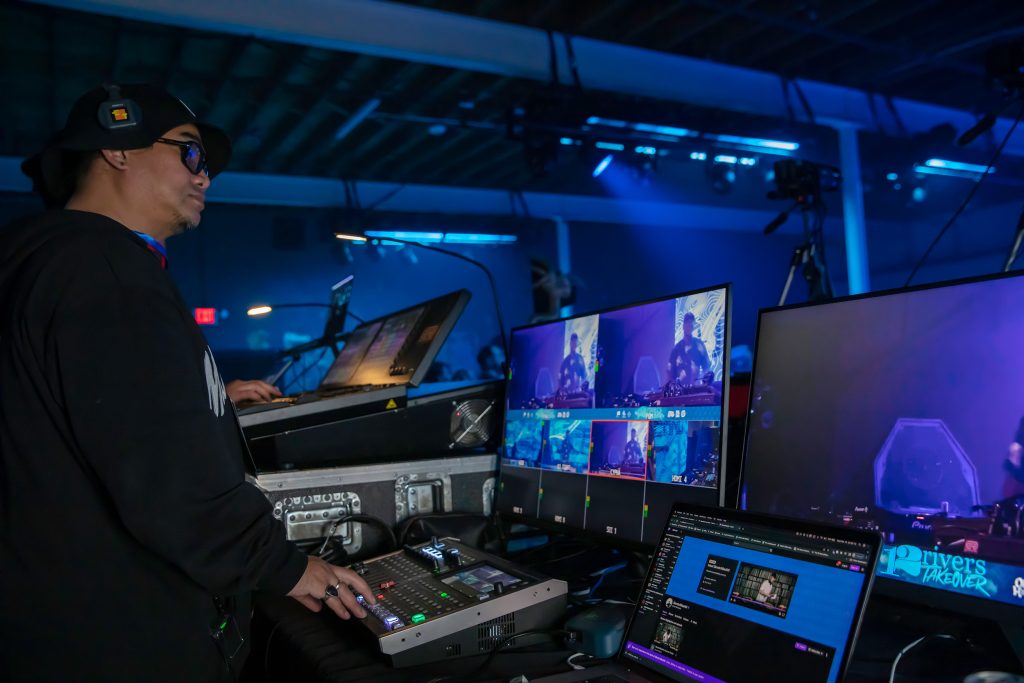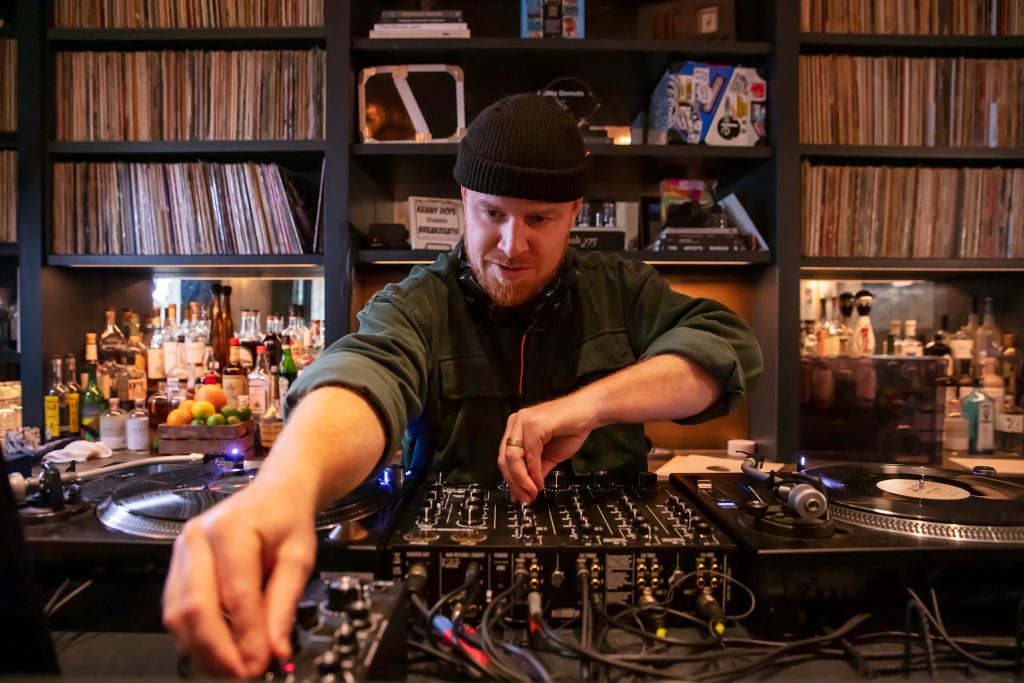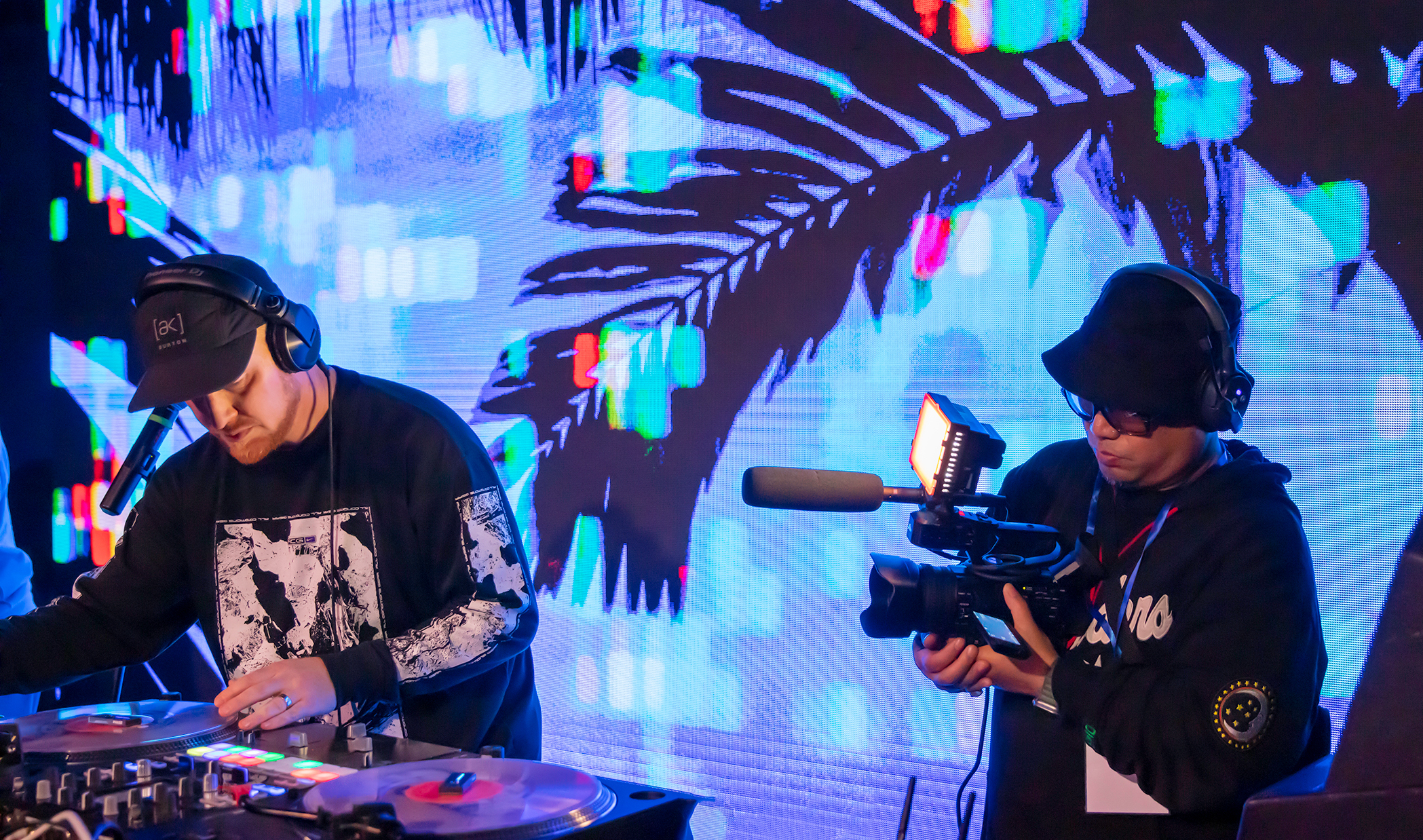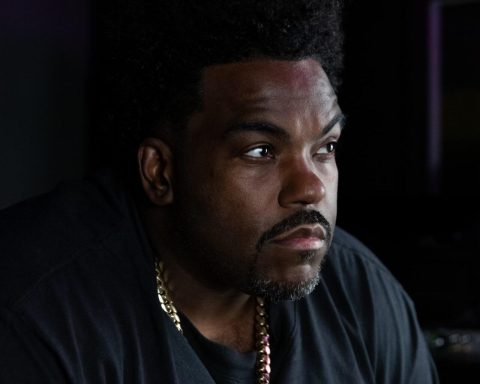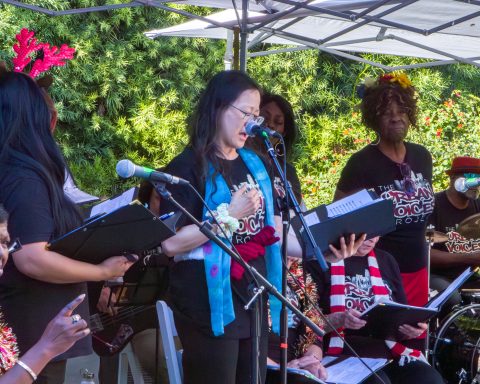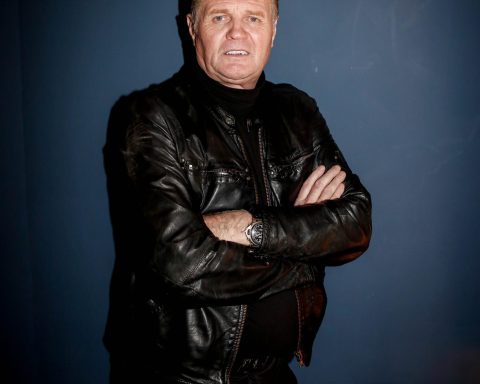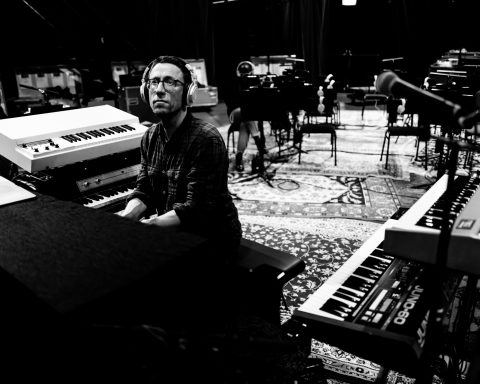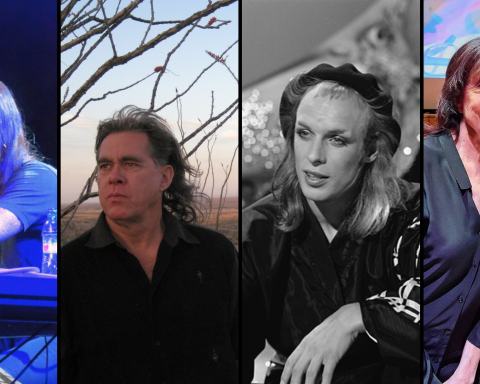It’s early afternoon, and the clouds have parted in the Austin, Texas, sky for Bastid’s BBQ. Paul Murphy, better known as Skratch Bastid, is bopping around the outdoor concourse of Native Hostel in a chef’s apron featuring his likeness. Offstage to the right, veteran live producer RomeDigs Reyes prepares to stream the event to the Skratch Bastid Twitch channel. The show will kick off within the hour with Dj K-Sprinkles, an aspiring turntablist and dedicated Skratch Bastid online community member. Following years of forced separation, in-person performances are in full swing—except now, livestreaming plays an integrated role. But it wasn’t easy to get here.
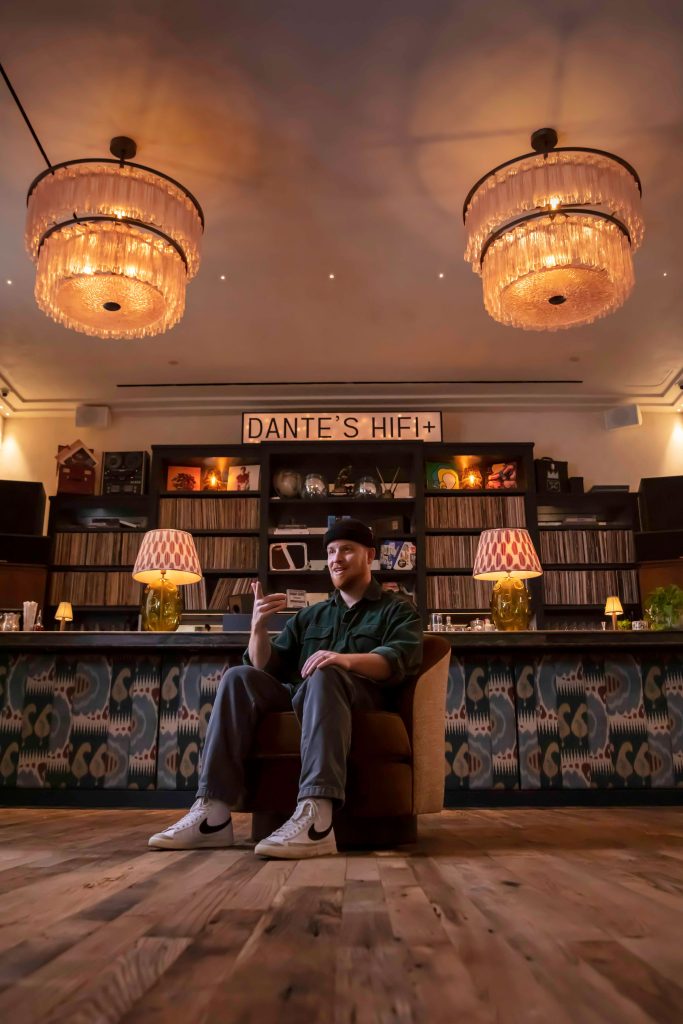
Good, Good, Good
Flanked by a wall of vinyl at Dante’s HIFI+, located within Soho House Austin, Murphy is calm in a green corduroy shirt, white Nikes, and his trademark beanie. Despite the prestigious surroundings, he’s lowkey about the aim of his BBQs. “Good music, good food, good people,” Murphy says, describing his event. “The idea is being able to share more of what I do.”
The BBQ ethos builds on the freewheeling spirit of Skratch Bastid’s Twitch channel. There, supporters like Dj K-Sprinkles congregate online to absorb marathon sets by Murphy. “In 2020, when I stopped doing shows, I started streaming myself from home,” he explains. What began as a means to an end became a vital lifeline for both followers and artist. “It’s increased my connection with my fans,” Murphy continues. “They have crews of people that form an identity.”
It wasn’t only that his audience was growing. Broadcasting from home, without the constraints of a club and with vinyl at arms-length, has numerous benefits. “I can show a bit more of myself,” he reveals, speaking to what may be the heart of the livestreaming experience.
“I’ve found you need something consistent so people can expect to find you. It lines up with their life and becomes part of their lives.”
SKRATCH BASTID
Everywhere and Anywhere
The connection with his audience hasn’t ebbed with his return to live stage. In fact, Murphy routinely meets members of his online community at performances from São Paulo to Toronto. As a DJ accustomed to keeping an unorthodox schedule, he finds the livestreaming ritual grounds him. “If there’s one thing that’s consistent, it is inconsistency,” Murphy laughs, referring to his lifestyle. “My stream has been my residency.”
The sense of comfort and familiarity keeps fans coming back. “I’ve found you need something consistent so people can expect to find you. It lines up with their life and becomes part of their lives.”
Wherever I May Rome
For Reyes, assisting artists in their broadcasts is a lifelong passion. Coming up in the Bay Area hip-hop community under the tutelage of legendary KMEL DJ, Sway Calloway, Reyes has an expert’s eye but the attitude of a lifelong learner. Moreover, he was an advocate of livestreaming long before the pandemic hit. “I was preaching livestreaming to everyone,” Reyes says, speaking from the green room at Austin’s Native Hostel, where he is busy running a week of star-studded events. “We can be in Russia and Brazil, all at the same time.”
With his youthful countenance enhanced by a stylish bucket hat and glasses, Reyes could as easily be an MC as a Pro A/V expert. His unique stance makes him a powerful spokesperson for livestreaming. “It’s a great way for artists to control their narrative—from broadcasting to publishing,” he asserts.
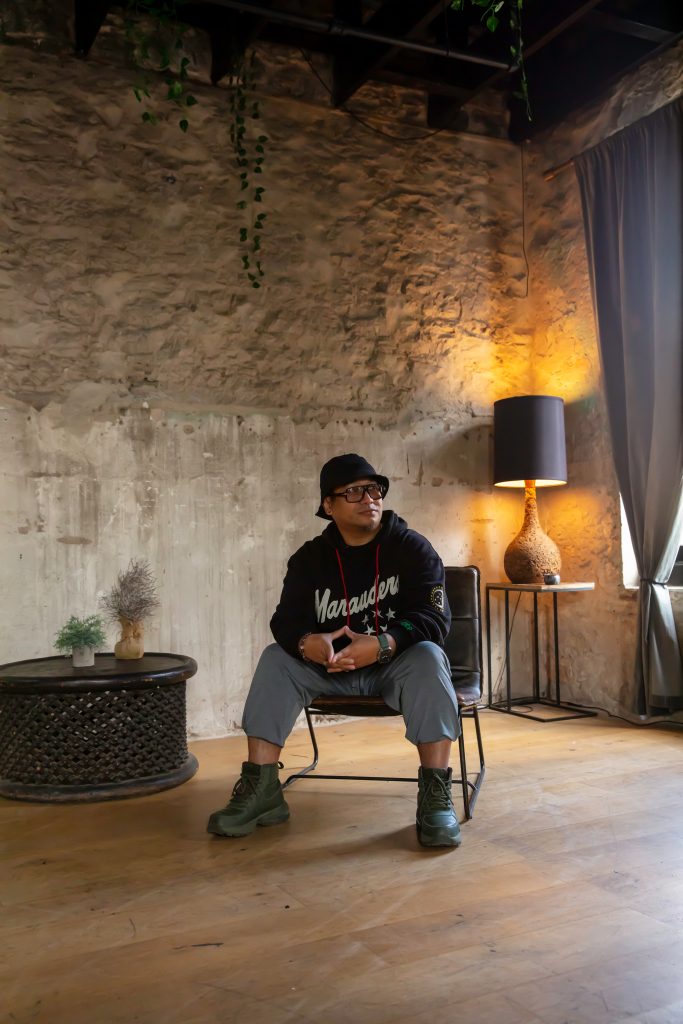
“It’s a great way for artists to control their narrative—from broadcasting to publishing.”
ROMEDIGS REYES
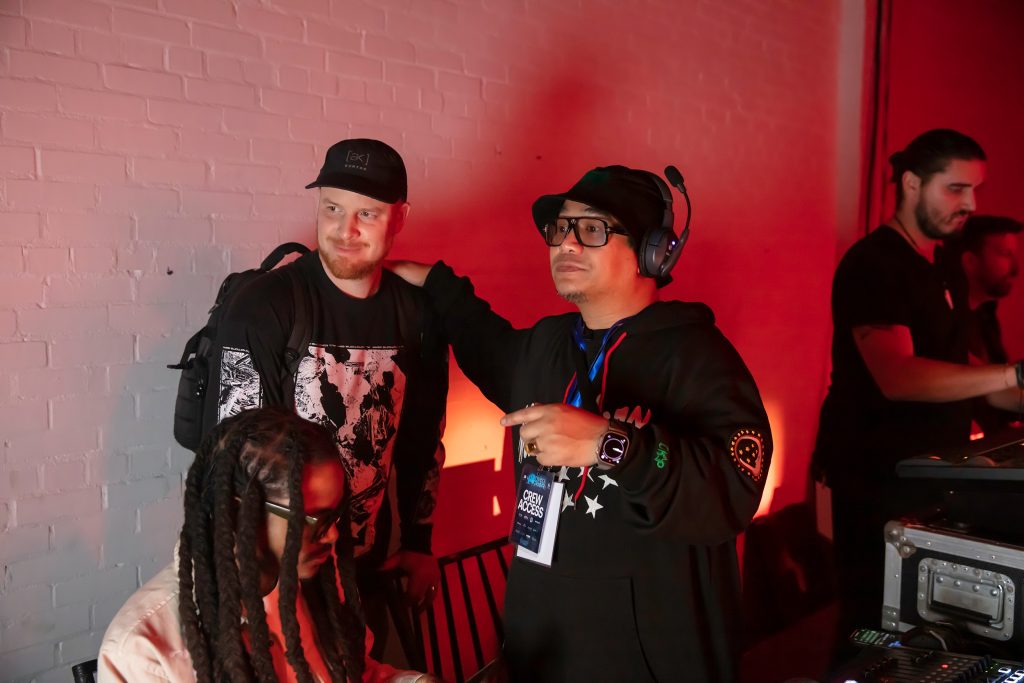
Teach an Artist to Stream
Murphy agrees with Reyes’ assessment of livestreaming as essential for independent artists. “This idea of broadcasting from somewhere makes people find you,” he says. “It’s really powerful to reach people directly.” Once his audience started showing up week after week, Murphy didn’t want to disappoint them. “You can build this collective that’s following you.”
Not that it’s necessarily easy to get started livestreaming. “There was a pretty hefty learning curve,” Murphy admits. Still, the unprecedented events of 2020 pushed many reluctant acts into the game.
Unlike Reyes, who grew up in populous California, Murphy spent his formative years in remote Bedford, Nova Scotia. “It’s pretty isolated; it’s the end of the road,” he recalls. Even radio signal was hard to come by and, therefore, extra valuable. “I caught this show on the radio by Buck 65—I had to stand funny in my bedroom.” Hearing that Canadian hip-hop artist on-air flicked the switch for Murphy. “I was hooked.”
“Turntables were not meant for scratching. It’s always been about taking something and making it creatively your own. We’re always redefining what we’re doing.”
SKRATCH BASTID
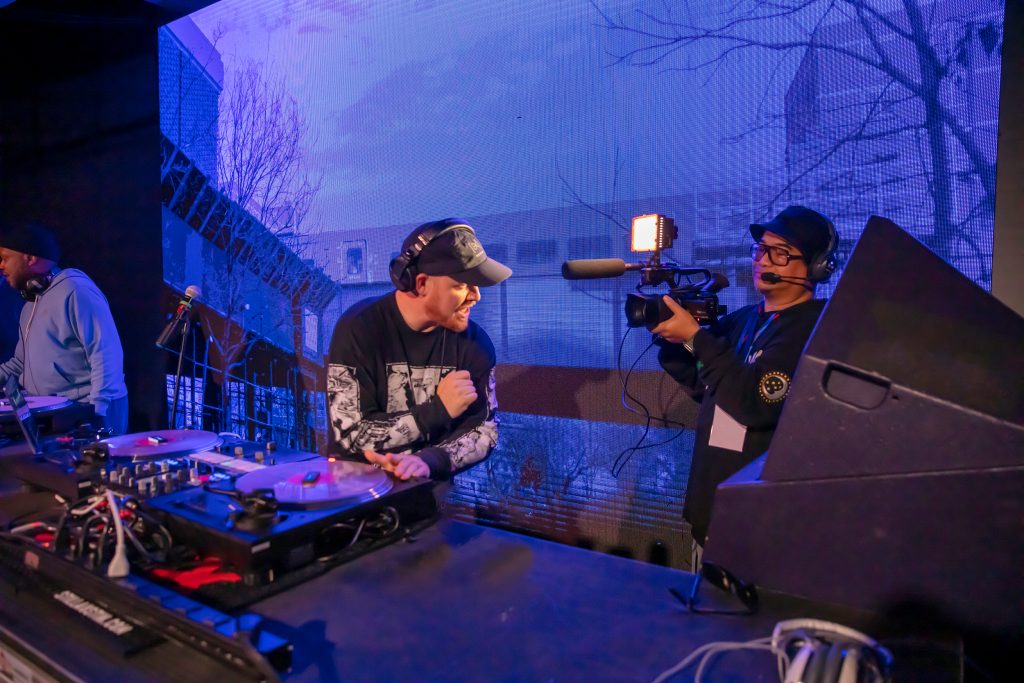
Manipulating Technology
As a DJ, Murphy’s career is defined by pushing boundaries. “Turntables were not meant for scratching,” he explains. “It’s always been about taking something and making it creatively your own. We’re always redefining what we’re doing.”
Reyes concurs, giving a hint about why DJs seem to be thriving in the livestreaming space. “What’s changed is that the DJs took it upon themselves to do their own programming. They’re getting creative with it.”
IRL vs. Online
With the floodgates of live shows reopened, acts have more options than ever. While there was an inevitable exodus of livestreamers, some, like Skratch Bastid, merged the two worlds. To Reyes, the seismic shift is age-based. “Artists love the road—you can’t compromise that,” he says. “Seasoned artists still want to interact with their fans organically.”
But for those who came up in the era of livestreaming, the conflict between online and live is nonexistent. “It’s a generational change,” Reyes confirms. “The younger artists are all about it. If it’s gonna get them more followers, they’re like, ‘Bring it.’”
Showtime
The industry hub of SXSW is an active week for both Reyes and Murphy. At an event featuring Skratch Bastid, Jazzy Jeff, Just Blaze, Talib Kweli, Redman, and other A-listers, Reyes is clearly in his element. He thrives in this space—when the pieces all come together. For Reyes, the magic is in the process.
Flanked by screens, Reyes monitors the event as it unfolds, streaming the proceedings to each artist’s platform. Murphy spends most of the evening onstage, including a lengthy tandem set with DJ Jazzy Jeff. As he spins, the Skratch Bastid logo behind him, his face illuminates Reyes’ camera views. The live event and its online counterpart blend gracefully in these meta moments. “I’m there with the audience,” Reyes says. “I see how the magic happens. Some moments just happen once.”
Setup for Success
Reflecting on the previous evening’s show, Murphy confirms that flying without a net live is his MO. “We call it a 2×4, totally improvised,” Murphy says of his dynamic collabs with the iconic DJ Jazzy Jeff. “He’s one of a kind, someone who defined DJ culture.”
Owning the means of production also allows Murphy to indulge this spontaneous side at home. “If I feel the urge to share something casually, I call it putting out the Bat Signal. It’s like inviting people into your home. There’s an intimacy there. People say, ‘I feel like I’m in your studio.’”
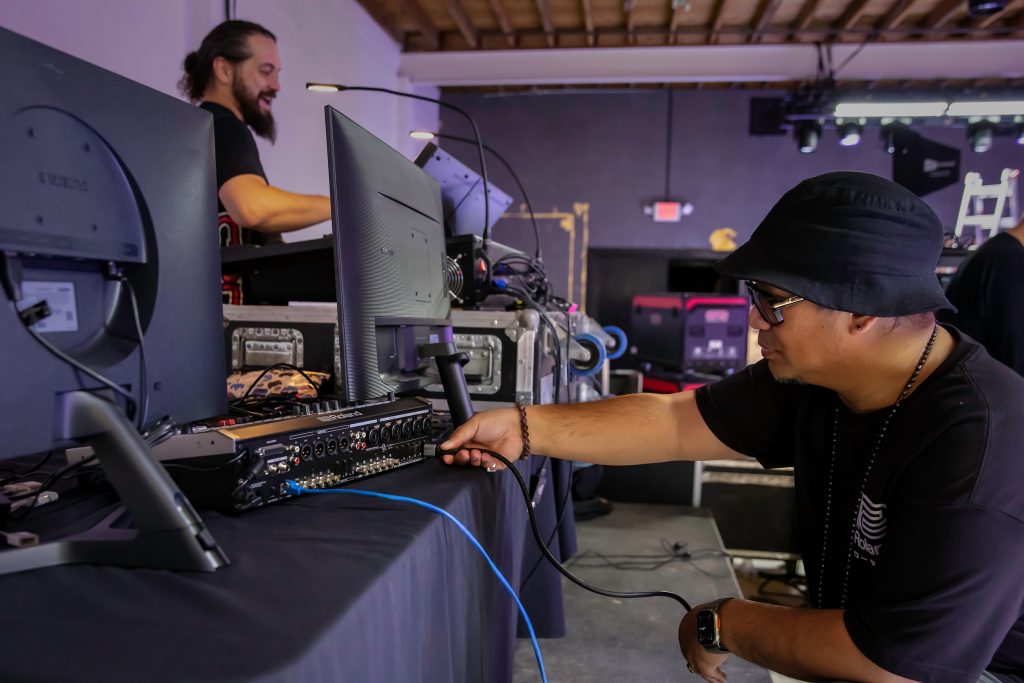
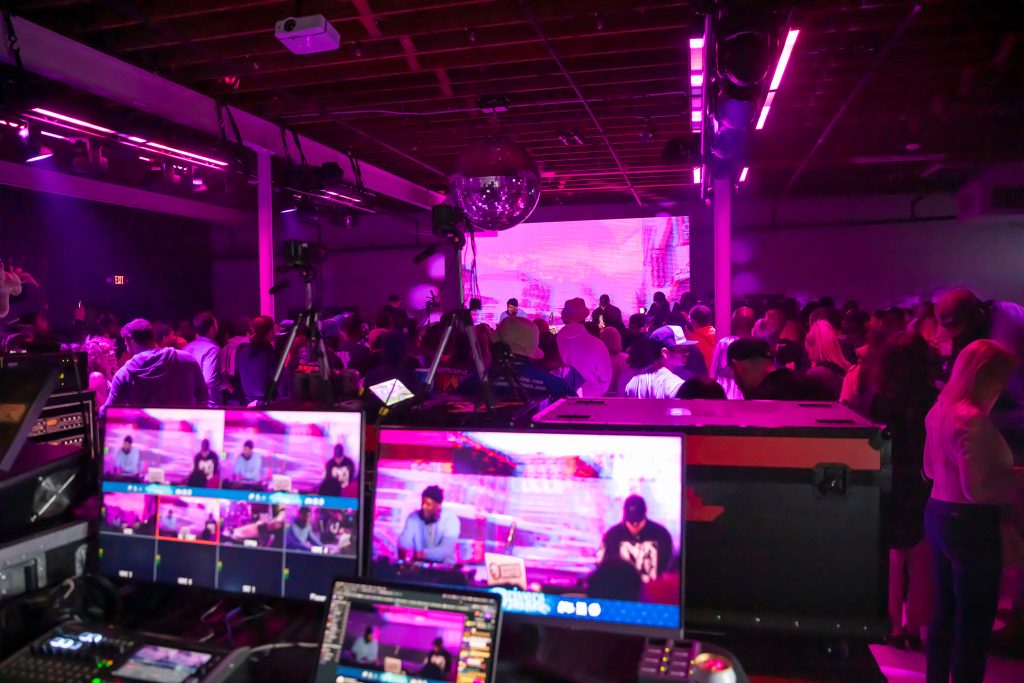
“Artists love the road—you can’t compromise that. Seasoned artists still want to interact with their fans organically.”
ROMEDIGS REYES
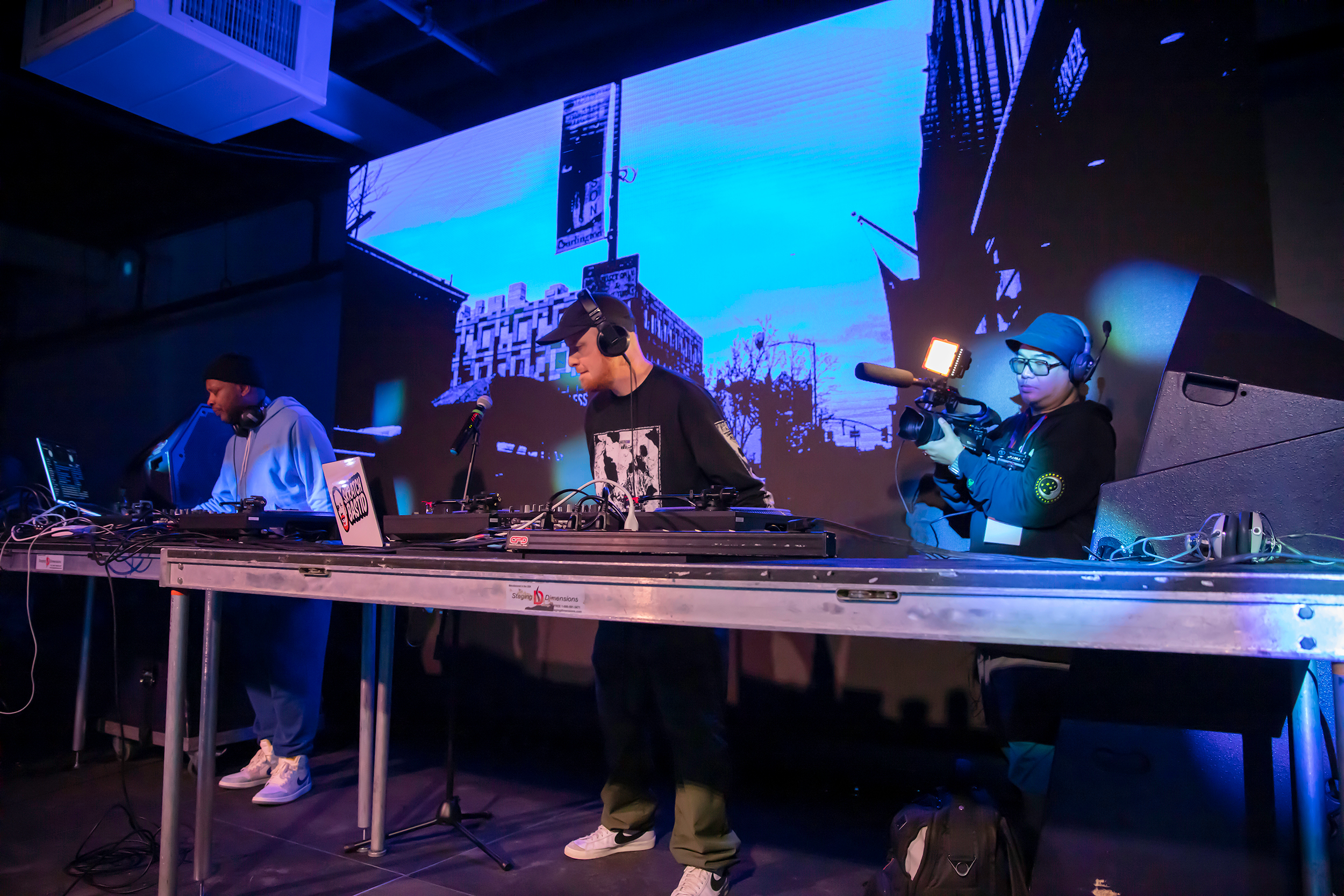
“If I feel the urge to share something casually, I call it putting out the Bat Signal. It’s like inviting people into your home.”
SKRATCH BASTID
“I’m there with the audience. I see how the magic happens. Some moments just happen once.”
ROMEDIGS REYES
Back and Forth
Murphy’s on-the-fly comments and connections between tracks, albums, and artists keep viewers engaged. “I’m so inspired by all the back and forth,” he confirms. “I keep all these memories attached in my brain. Finding your niche audience, you can make cool discoveries in real-time.”
While assisting DJs Shortkut and Rich Medina on their early pandemic livestreams, Reyes noticed how the artists connected with their audiences. “We were bugging out and knew something was happening,” Reyes recalls. “These kids were starting to get into vinyl. We were educating them on old school hip-hop, new jack swing, yacht rock.”
Putting the Pieces Together
Murphy’s embrace of the medium has grown along with his audience. “My first experience streaming events was just broadcasting; I didn’t understand the minutiae.” Reyes provided technical support in the early days. Then, the Skratch Bastid Twitch channel took off.
“I underestimated how many people were out there,” Murphy says, clearly moved by the memory. “I’m shouting out people from every continent. It almost takes my breath away. You’re getting global thoughts, global feedback.” The trick now is bringing that same sense of worldwide community to live shows. Luckily, Murphy has a persona custom-made for stages of any size, an unquantifiable glow many simply call “it.” Yet he continues to put in the hours that make his show an online destination.
“I underestimated how many people were out there. I’m shouting out people from every continent. It almost takes my breath away. You’re getting global thoughts, global feedback.”
SKRATCH BASTID
The Connection is Real
“Livestreaming takes a lot of work,” Murphy explains, recalling those early efforts. “When you start streaming, it can be overwhelming. I’ve become comfortable with that exchange of energy.” The look in his eyes as he describes connecting with his crew in the chat confirms the vitality of that exchange.
Plus, just as DJing has its network of venues, promoters, and fans spanning continents, Murphy’s channel has become a genuine community. “When I’ve taken breaks, people are super appreciative to have me back,” he says. “The human connection is real—they want to support you.”
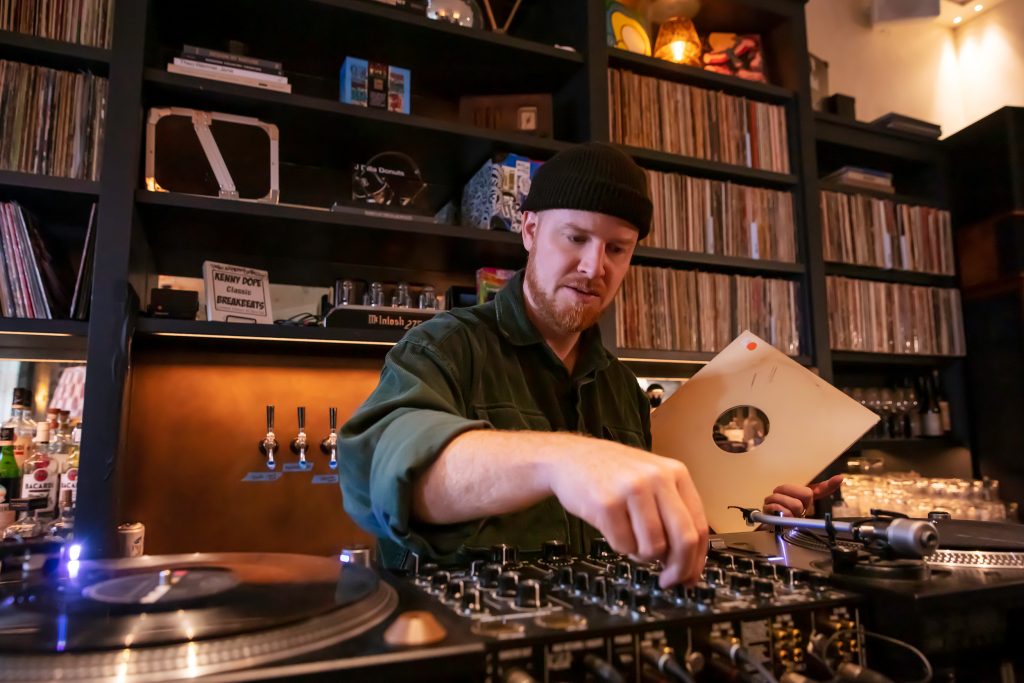
“When I’ve taken breaks, people are super appreciative to have me back. The human connection is real—they want to support you.”
SKRATCH BASTID
“This culture—I don’t take it lightly. Technology has to be invisible. I’m here for the artist.”
ROMEDIGS REYES
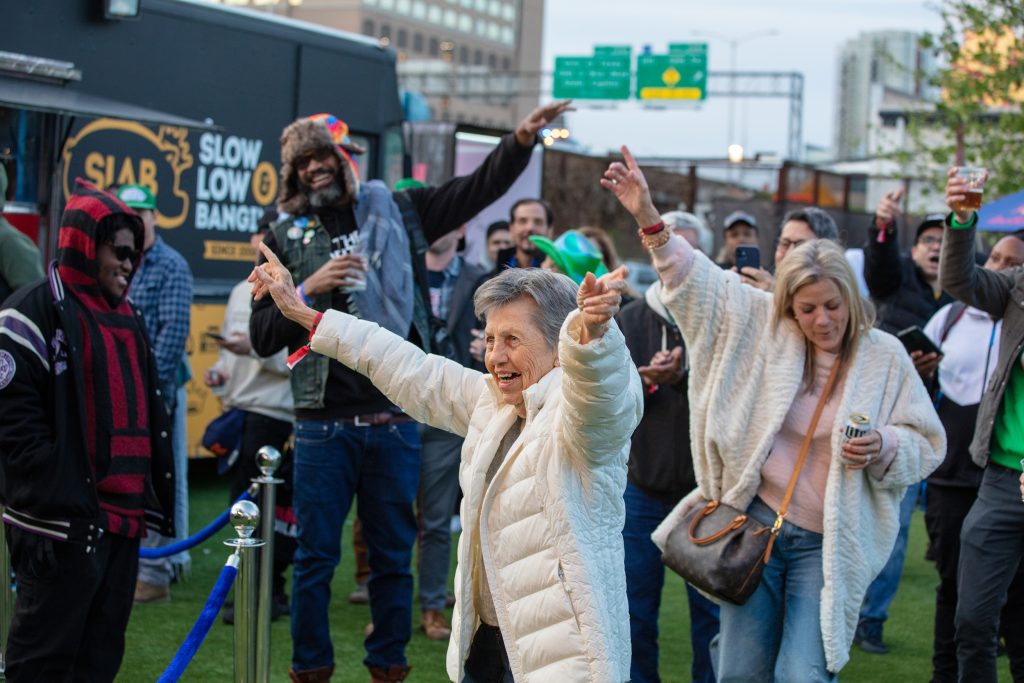
Art of the Pivot
As the acute stage of the pandemic receded, music fans flocked to concerts en masse. From sweaty club gigs to packed arenas, the thrill of sharing space after years of stop-starts and cancellations made live shows irresistible. Reyes understands the appeal as well as the potential of hybrid events. “There’s nothing like seeing an artist in person—but the globe is a phone call away.”
To Murphy, a globetrotting DJ with an active itinerary, the rapid pivot to in-person shows took sensitivity and strategy. “You’ve got to manage that input and output in your own artistic life,” he explains. “Sometimes my weekly stream is the only one I can get in. As much as there’s a challenge there, there is an opportunity.”
It isn’t about segmenting the worlds of in-person and livestreaming so much as intertwining the experiences. To that end, Reyes views himself as a conduit. “This culture—I don’t take it lightly. Technology has to be invisible.” That attitude of service to the event he’s broadcasting is his north star. “I’m here for the artist,” he states plainly.
“Something about streaming reminds me of the early days of the internet,” Murphy posits. “People are sharing their interests, their perspectives. You meet them, and you feel like you know them. People want to be a part of it in real life.”
When it all coalesces, as it does at Bastid’s BBQ on the Friday of a busy SXSW, the results are extraordinary. Members of Murphy’s Top Grillin’ VIP crew interact with each other in person. A curated lineup of acts shares the stage, sets flowing smoothly into each other with plenty of collabs and extended jams. It’s a 7-hour musical Shangri-la, a celebration of hip-hop, DJing, and electronic sounds from across the globe. Audience members of all ages and walks of life dance happily to the music; there is no doubt that society missed this ritual.
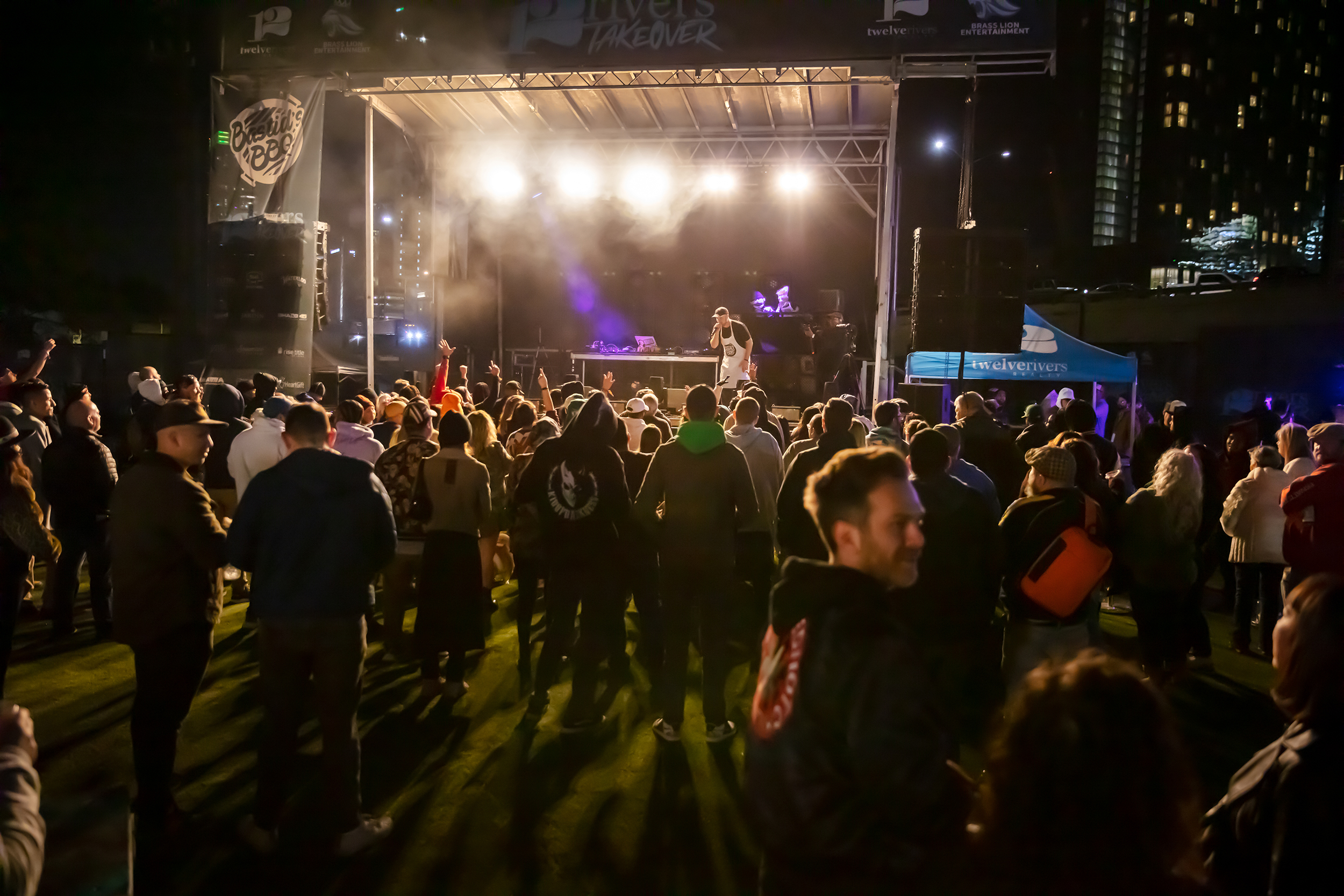
Smokin’ Lineup
Dj K-Sprinkles, aka Kaitlyn Reyes, receives a Skratch Bastid endorsement at the start of her set. Perched on a road case, the Dallas DJ rips into old-school cuts by LL Cool J, the Notorious B.I.G., and Dr. Dre, punctuated by bursts of dexterous scratching. São Paulo’s DJ Nyack sets a confident tone for his set with a pair of relaxed 1981 tracks; Maze’s “Before I Let Go” blends seamlessly into “Never Too Much” by Luther Vandross.
Boasting charisma for days and the BBQ’s wildest fashion is Vancouver, BC’s Snotty Nose Rez Kids, a pair of indigenous rappers backed by DJ Kookum. Their angsty, righteous anthems convert the rapidly expanding crowd. Later, powerful sets by legends Talib Kweli and Devin the Dude, plus Austin’s own Cha’keeta B, illustrate the relationship between the DJ and MC at the core of hip-hop.
The stylistic variety of the BBQ echoes Skratch Bastid’s livestreams. Speaking backstage after her set, Dj K-Sprinkles confirms the global reach. “You get to see all the fans, and they tell you where they’re from,” she shares. “This person is from Africa or another completely different country across the world.”
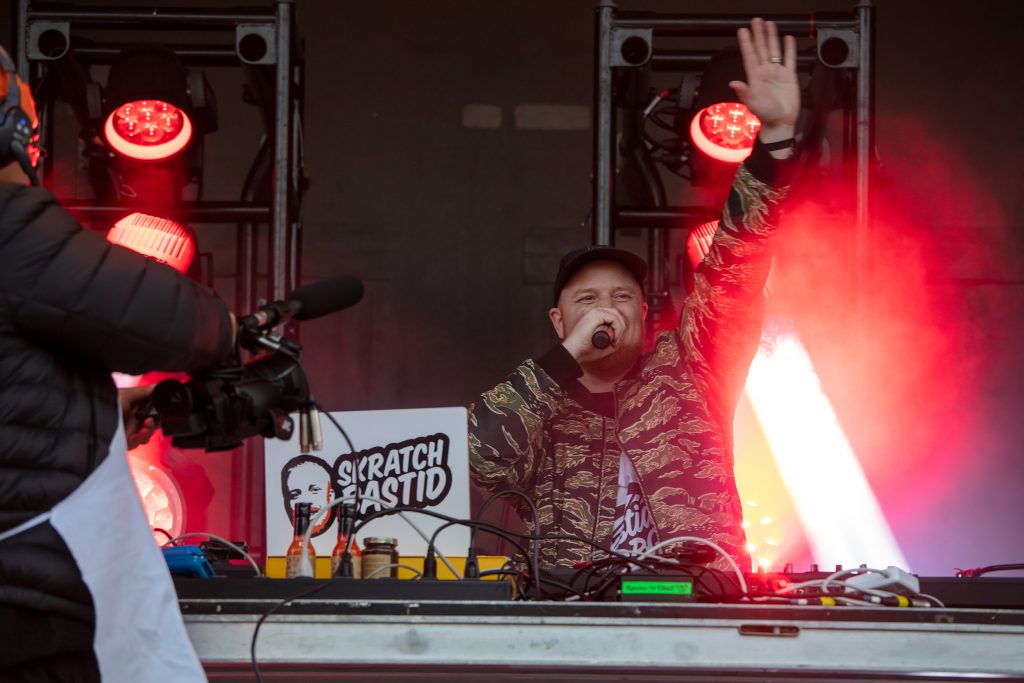
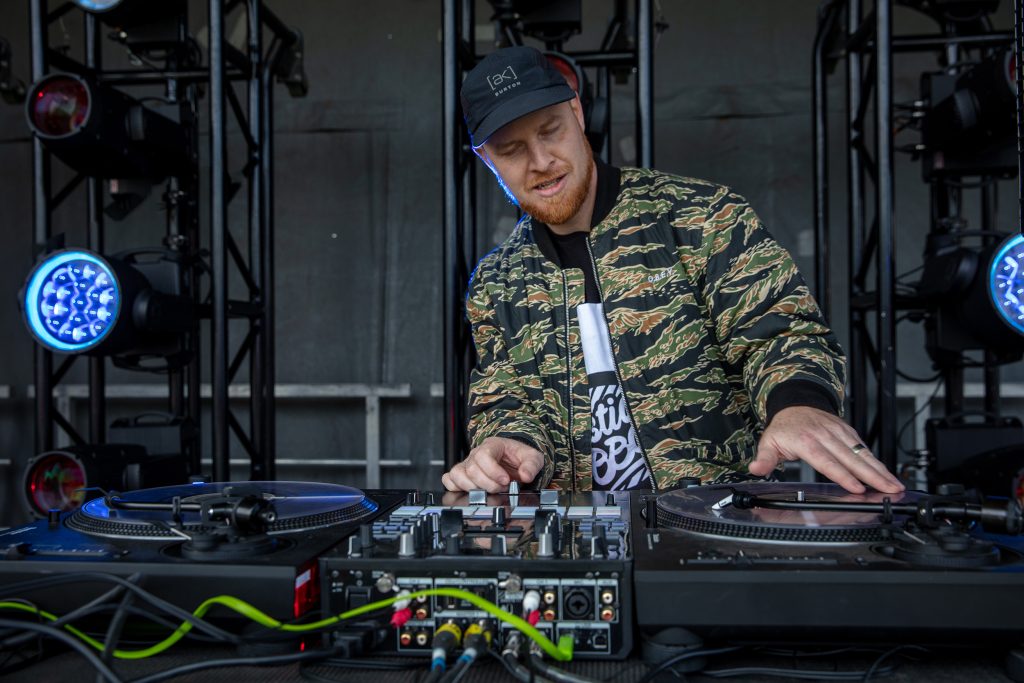
Let Him Cook
At the center of the action during the entire day-long show is Murphy. A natural extrovert and crowd-pleaser, he’s rarely far from the stage—priming the audience, introducing acts, and savoring the flavor of the event he created and continues to nurture, online and in person.
When he glides onto the stage for his full set, Murphy instantly captivates the crowd with a smattering of old-school beats. A shoutout to his online community segues into Slick Rick’s immortal “Children’s Story.” By the time he’s cutting up David Bowie’s “Let’s Dance,” the show has become a full Skratch Bastid lovefest.
From his perch, Reyes observes closely and switches camera angles. His streams to artists’ individual accounts expand the event’s reach beyond a central event livestream. “Twitch has been the home for DJs,” Reyes explains. “We’re combining everyone’s channels to make this bigger.”
“People bring back souvenirs; I bring back musical souvenirs. The streams are now inspiring my live performances.”
SKRATCH BASTID
“Sit back, let it breathe. Be a tool for the artist.”
ROMEDIGS REYES
Souvenirs
A day earlier at Dante’s, Murphy waxed philosophical about how he’s bridging the gap between in-person and online. “Through streaming, you can give people more. It plays to my strengths of music nerdery,” he laughs.
The gifts he gets from this new model are more emotional than monetary. “People bring back souvenirs; I bring back musical souvenirs,” he explains. “The streams are now inspiring my live performances.”
Reflecting on his role, Reyes offers spontaneous tips for livestreamers, whether they are broadcasting from a live show or their home studio. “Sit back, let it breathe,” he imparts. “It’s not about you. Be a tool for the artist.” Despite Reyes’ inherent humility, there’s no doubt this is advice earned from thousands of hours in the field.
That same fundamental reverence for the audience is crucial to Murphy. “One of the greatest feelings in the world as a DJ is sharing a song you love with someone, and they’re hearing it for the first time,” he says. “I’m always channeling the music to you. I do so with honor.”
